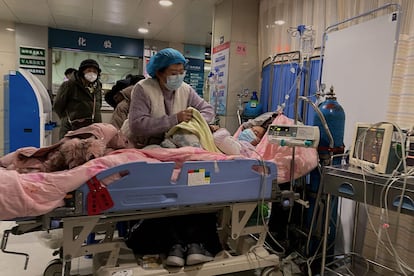China buckles under Covid: ‘The situation is worse than people think; many people are dying’
Beijing’s decision to end its strict zero-Covid policy has led to a spike in cases. Although official national figures remain low, local authorities have reported between 500,000 and a million per day

Amid the biggest wave on contagions in China since the beginning of the Covid-19 pandemic, Beijing is a city of parallel realities. On the one hand, the situation in hospitals is critical, as was feared, which was the reasoning for the authorities extending the country’s strict zero-Covid policy for as long as possible. But on the other hand, as of last weekend, Beijing is crowded with families who, having contracted coronavirus and recovered, have set out under relaxed protocols to see the Christmas lights, buy presents, go to stores and restaurants or ice skate on the seasonal rinks. This dichotomy in the capital is also taking place on differing scales across all of China’s main cities. The government’s primary concern, however, is on rural areas, which are already preparing for an imminent avalanche of infections due to the mass travel Chinese citizens will undertake for the Lunar New Year vacations.
Disquiet has spread beyond China’s borders, particularly among neighboring countries. Since Beijing announced an end to mandatory quarantine procedures for foreign visitors to the country and the renewal of passports for Chinese citizens to travel abroad, several countries have imposed restrictions or are considering doing so, partly because of the lack of transparency they believe Beijing has shown over pandemic data. Japan, Taiwan and India require a negative PCR test for Chinese travelers to enter their territories. Meanwhile, US officials quoted by Reuters have expressed their concern and have not ruled out putting restrictions in place.
“The current situation does not invite optimism. I don’t know if we have passed the peak in deaths already, or when we will pass it. The only thing I can share is that the situation is worse than people think and that many people are dying. I won’t say anything more,” Dr. Jia said via a WeChat message. Jia works in a Beijing ER and says it is overwhelmed. “We have a lot of patients, many with other underlying issues, who are in serious condition. Resources are insufficient; we don’t have as much medicine or equipment as we expected. We are very tired. We hardly get any breaks because there is a huge shortage of staff at the moment. We come into work sick, but, in any case, we’re not giving up.”
In another publication on WeChat (a platform similar to Facebook), Jia advised her contacts with elderly relatives or who have underlying conditions to do what they can to protect their loved ones: “The reality is that to see a doctor you have to wait a minimum of four hours in the ER, maybe even a whole day, so they can rehydrate you. But even if they manage to do that, a patient might not receive the most appropriate treatment for their illness because even if they want to prescribe it, there are no medicines. Even if I want to do a thorough medical examination and put a patient on a ventilator I can’t, because there are not enough doctors and nurses. So, please take care of yourselves,” she wrote.
Crucial weeks in China’s Covid battle
Western epidemiologists warn that China is facing the most dangerous weeks in its coronavirus management since the pandemic began at the start of 2020. On December 7, Beijing made a snap decision to backtrack on its zero-Covid policy after waves of protests against the measures that have dictated daily life for the country’s 1.4 billion inhabitants broke out across the country. That decision, which came at a time when China was already tackling its largest outbreak to date and in the middle of winter, has brought on a tsunami of cases that has put the health system on the ropes.
Last Sunday, local officials in the eastern city of Zhejiang, which has a population of 65 million, announced that daily Covid cases stood at over one million, while in the port city of Qingdao, where 10 million people live, it was estimated that 500,000 infections were taking place every day. These figures contrast wildly with estimates from China’s National Health Commission (NHC), which stated that there had been only 4,103 new cases in the entire country on Sunday. Shortly after that announcement, the NHC said it would stop issuing daily Covid-19 related statistics in the near future.
Although the end of the zero-Covid policy was accompanied by a 180-degree turn in the official narrative regarding the severity of the disease, state media is calling for people to remain at home to avoid overcrowding hospitals. The Lunar New Year celebration, which takes place between January 21 and 27, is causing concern among Chinese epidemiologists, who warn that the next two waves of contagions will be caused by mass travel during the vacations. While the current wave is mainly affecting large urban areas, subsequent waves will hit rural zones where health systems are not nearly as capable as those in the major cities of stemming the tide.
The real number of Covid deaths in China
“We are going through the toughest moment of my 30-year career,” Zhu Huadong, director of the Emergency Department at Peking Union Medical College Hospital, said in a report broadcast by Chinese international broadcaster CGTN. “More than 75% of patients are in serious condition, it is an unprecedented challenge.”
In state-run media, however, there is no mention of an increase in the number of deaths, as health and funeral home personnel have confirmed to EL PAÍS in recent weeks. Officially, China has recorded 5,245 Covid-related deaths since the start of the pandemic, and barely a dozen since the zero-Covid policy was reversed. The health authorities have explained this away on the grounds that the new methodology for counting deaths only recognizes those whose primary cause is pneumonia or respiratory failure; a different approach to that applied in the rest of the world and one that has been criticized by experts. British health data analysis organization Airfinity estimated last week that around 5,000 people are dying in China every day and that the total number of Covid-related deaths could rise to between 1.3 and 2.1 million this winter.
Sign up for our weekly newsletter to get more English-language news coverage from EL PAÍS USA Edition
Tu suscripción se está usando en otro dispositivo
¿Quieres añadir otro usuario a tu suscripción?
Si continúas leyendo en este dispositivo, no se podrá leer en el otro.
FlechaTu suscripción se está usando en otro dispositivo y solo puedes acceder a EL PAÍS desde un dispositivo a la vez.
Si quieres compartir tu cuenta, cambia tu suscripción a la modalidad Premium, así podrás añadir otro usuario. Cada uno accederá con su propia cuenta de email, lo que os permitirá personalizar vuestra experiencia en EL PAÍS.
¿Tienes una suscripción de empresa? Accede aquí para contratar más cuentas.
En el caso de no saber quién está usando tu cuenta, te recomendamos cambiar tu contraseña aquí.
Si decides continuar compartiendo tu cuenta, este mensaje se mostrará en tu dispositivo y en el de la otra persona que está usando tu cuenta de forma indefinida, afectando a tu experiencia de lectura. Puedes consultar aquí los términos y condiciones de la suscripción digital.









































